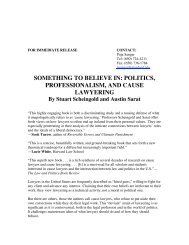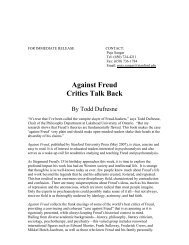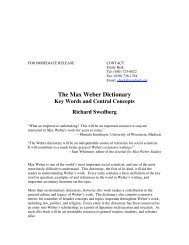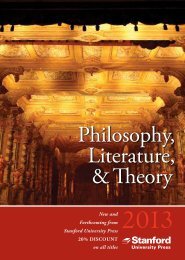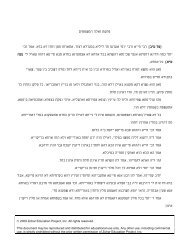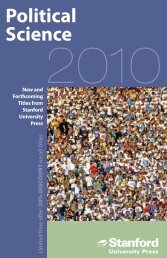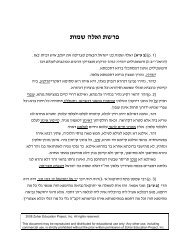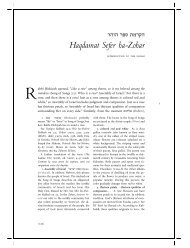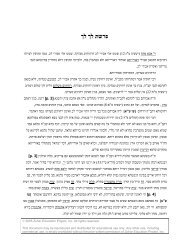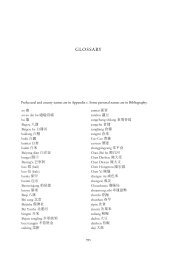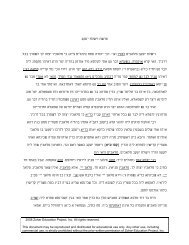Front Matter (PDF) - Stanford University Press
Front Matter (PDF) - Stanford University Press
Front Matter (PDF) - Stanford University Press
Create successful ePaper yourself
Turn your PDF publications into a flip-book with our unique Google optimized e-Paper software.
who probably immigrated to Safed from elsewhere in the Ottoman<br />
(1522±1570),<br />
and Rabbi Isaac Luria (1534±1572), who came from Egypt, chose to live<br />
realm,<br />
Safed because of the nearness of holy graves and the possibility (described<br />
in<br />
Cordovero in his Sefer Gerushin) of achievingmystical knowledge through<br />
by<br />
upon them. Amongthe sacred dead of the Galilee, Rabbi Shim'on,<br />
prostration<br />
acclaimed as the undisputed author of the Zohar, took a central place.<br />
now<br />
speci®cally hoped to achieve a true understandingof passages in the<br />
Luria<br />
by visitingwhat he believed to be the grave of its author.<br />
Zohar<br />
``return'' of Kabbalah to the Galilean landscape of the Zohar's heroes<br />
The<br />
the imagination of Jews throughout the Diaspora. Reports of the holy<br />
®red<br />
of Safed, especially the mysterious ®gure of Luria, known as ha-ARI ha-<br />
men<br />
(the Holy Lion), were widely copied and printed in several versions. A<br />
Qadosh<br />
literature of both kabbalistic writings and ethical or pietistic works in¯uenced<br />
vast<br />
by Kabbalah poured forth from the printingpresses of Venice, Constan-<br />
and AmsterdamÐto be distributed throughout the Jewish world. It did<br />
tinople,<br />
take longuntil the claim emerged that the soul of the ARI was in fact a<br />
not<br />
of that of Rabbi Shim'on son of Yoḥai.<br />
reincarnation<br />
was in this period that the Zohar came to be considered not only an<br />
It<br />
and holy book, but a canonical text, bearingauthority comparable to<br />
ancient<br />
of the Bible and the Talmud. The authority of the Zohar as the prime<br />
that<br />
of mystical truth had already been considered by fourteenth-century<br />
source<br />
some of whom came to view its word as superior to that of Naḥ-<br />
kabbalists,<br />
for example, because of its allegedly greater antiquity. Naḥmanides<br />
manides,<br />
portrayed by these as a ``modern'' source, whose word could be set aside<br />
was<br />
a contrary quotation from the work of Rabbi Shim'on son of Yoḥai. But in<br />
by<br />
sixteenth century, it was said that Elijah himself had appeared to Rabbi<br />
the<br />
and the Zohar's authority became that of heaven itself. Meir ibn<br />
Shim'on,<br />
traced the kabbalistic tradition back to Sinai, claimingthat Zoharic<br />
Gabbai<br />
were given to Moses along with the written Torah.<br />
secrets<br />
status, in the context of Judaism, bears with it halakhic authority<br />
Canonical<br />
well as mystical prestige. If the Zohar contained the ``true'' meaningof both<br />
as<br />
and oral Torah, might it be used as a source of legal authority, es-<br />
written<br />
in ritual and liturgical matters, as well? This question came up among<br />
pecially<br />
scholars, especially in the few cases in which the Zohar seemed to<br />
halakhic<br />
the majority opinion of rabbis decidingthe law on the basis of<br />
contradict<br />
precedent and its formulation in responsa and codes. In fact, as<br />
Talmudic<br />
have shown, these cases mostly turn on local customÐthe Zohar re-<br />
scholars<br />
Franco-German or old Spanish customs, while the halakhah had<br />
¯ectingeither<br />
in favor of others. A classic example of such halakhic dispute involving<br />
decided<br />
Zohar concerns the donningof te®llin on the intermediate weekdays of<br />
the<br />
and Sukkot. TheZohar expresses itself most strongly on the issue, consideringthe<br />
Pesaḥ<br />
wearingof te®llin on those days an insult to the festival and a<br />
Introduction<br />
lxxiii<br />
virtual sacrilege. Although the halakhic codes mostly tended otherwise, some



